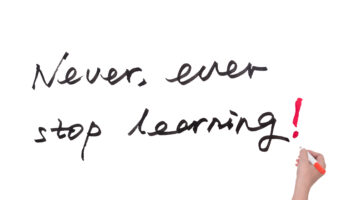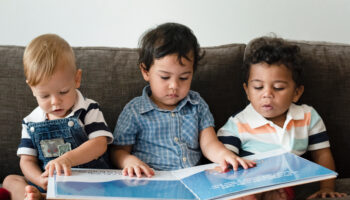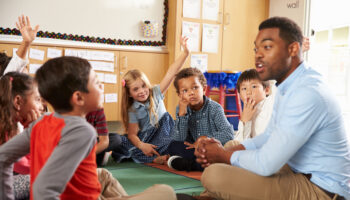Michelle Long
Living with a teenager I sometimes forgot what a real conversation was like. I would ask, “How was your day?” I got, “Good.” I asked, “What are your plans?” I got, “I dunno.” I asked, “Will you help me with…?” I got, “Whatever.” All of my years of training and experience had taught me to ask the who, what, when, where, how, and why questions to get longer more complex answers. I used to have wonderful, in-depth, creative, imaginative conversations; however, I was not prepared for the hiatus that would occur during the teenage years. It takes two people to have a conversation. Although two people may be present and talking, a conversation does not occur unless there is a back and forth exchange in which information and ideas are shared.
In my longing for those rich conversations to return to my household, I find myself observing many missed opportunities for rich conversations while I am out in the field. I see teachers talking and asking questions during group times, but the back and forth exchange between the teacher and the child is often missing. It is easy to get consumed by the daily routines of work and life. We often find ourselves spewing out directions and essential bits of information or asking questions that only require a rote or one-word answer.
After some research I tried a different approach on the home front. Rather than asking, “How was your day?” which is a rather broad question, I narrowed it down and would ask:
- What was the best part of your day?
- What was the worst part of your day?
- Tell me something that made you smile today?
- Tell me something that frustrated you today?
This approach worked for a brief period until the day he came in the door and answered before I could ask, “Coming home, going to school, nothing, answering these questions.”
Okay, what can I take away from this? Aha! At least he likes coming home; home is safe space and he likes home. I must be doing something right even if I am failing in the conversation department at the moment. And so the quest for a real conversation with a teenager continues.
There are times we may remember to ask the questions but forget to listen, really listen, to the answers that are given and what those answers are telling us about the child.
For younger children, the simple short answers they provide can give us a wealth of information. An activity I have used in a professional development session (and you could try at your own staff meetings) includes having participants form small groups and ask the questions:
- You just finished reading a story about a train (Little Engine that Could, Freight Train, etc.). If you were on that train, where would it take you?
- If you wanted some peace & quiet where would you go to get it?
After participants have time to share their responses, I ask them to look for places they (the group) feel safe or happy. The discussion continues with additional questions we could be asking in our classrooms to prompt additional insight into the children in our care.
For older children, the questions should become more intricate, encouraging them to use critical thinking skills to develop more complex answers.
- If you wanted to get to Grandma’s house, how would you get there?
- I wonder why people live on the land and fish live in the water.
- If you could have any super power what would it be? Why?
There is a hierarchy to all learning and it needs to be taken in steps. One cannot evaluate what they do not know or remember. One cannot compare what they do not understand.
Taking the time to have rich conversations with children, asking the questions that promote critical thinking and problem-solving skills, and listening to, and for, the interests of the children in the answers they provide are all steps in the learning process. Those steps show children that you care, that you are interested in what they have to say, and that their thoughts and ideas matter. The conversations build the confidence in the child to continue to think and grow and learn.
The questions we ask when they are young build the foundation for the conversations of the future. So one day the teenager can come through the door exclaiming, “I have to tell you what happened today!”
Additional Resources:
Book: Big Questions for Young Minds: Extending Children’s Thinking – Strasser and Bresson
Websites:
Conversation Starters for Teens
We want to hear from you…tell us about your effective conversation starters! Comment below with examples that have started rich conversations in your early childhood classrooms.




